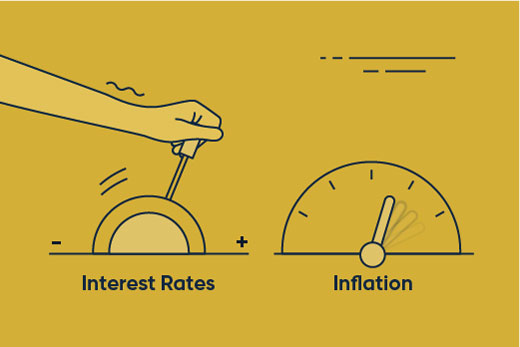Digital Zeitgeist – UK and US Must Uphold Elevated Interest Rates to Quash Inflation – Warns IMF
The International Monetary Fund (IMF) has cautioned that interest rates in the UK will need to remain higher for an extended period to curb persistently high inflation. This advisory reflects a similar recommendation for the US Federal Reserve, with both central banks urged to raise official borrowing costs more aggressively than previously assumed, according to the IMF’s recent update on the global economic landscape.
The IMF’s analysis, which now expects it will take until mid-2025 for inflation to return to the UK government’s 2% target, represents a six-month delay from previous estimates. The delay is attributable to the prolonged time it has taken for cost-of-living pressures to relax. This scenario has resulted in the IMF raising its anticipated peak in UK interest rates to 5-5.5%, up from the 4.5% projection published in April. Threadneedle Street, the metonym for the Bank of England, is thus anticipated to maintain a stringent policy until the close of 2024.
Despite recording the highest growth rate among the G7 economies in 2021 and 2022, the UK is predicted to be the second slowest-growing economy in 2023. Germany, forecasted to contract by 0.3%, is the only economy expected to grow at a slower rate.
Currently, UK interest rates are at 5% following 13 consecutive increases since December 2021. The Bank of England’s monetary policy committee, meeting in the coming week, will likely face expectations of another increase, potentially taking the interest rate to 5.25%.
In its semi-annual world economic outlook, the IMF projected that the UK economy would grow by 0.4% in 2023. This figure is a 0.7% improvement from the forecast three months prior, owing to factors such as “stronger-than-expected consumption and investment from the confidence effects of falling energy prices”. A more stable post-Brexit scenario, following the Windsor framework agreement with the EU, and a resilient financial sector, also contributed to this optimistic upgrade.
However, despite these positive indicators, the growth forecast remains weak by historical standards. As the IMF report states, “The global recovery from the Covid-19 pandemic and Russia’s invasion of Ukraine is slowing amid widening divergences among economic sectors and regions.” Furthermore, global inflation is expected to decline from 8.7% in 2022 to 6.8% in 2023, then to 5.2% in 2024.
The IMF does acknowledge the risks involved in this approach. Overly aggressive tightening by central banks could potentially trigger recessions. Despite this, the fund stressed the primary priority should be achieving sustained disinflation, urging banks to concentrate on restoring price stability and augmenting financial supervision and risk monitoring.
The IMF’s focus is on core inflation, which excludes fluctuating costs such as energy and food. This figure remains high, significantly exceeding targets set by central banks. However, it is noted that a wage-price spiral – a sustained period of accelerating prices and wages – doesn’t appear to be a current risk in most advanced economies.
The recommendations from the IMF carry a clear message for major central banks – to counteract persistent core inflation, monetary policy will need to be tightened further.
Conclusion: A Devil’s Advocate Viewpoint
While the IMF’s advice is predicated on achieving long-term economic stability, it’s important to acknowledge the potential ramifications of maintaining high-interest rates. A critical consideration is the impact on households and businesses that rely heavily on credit. Higher interest rates mean higher borrowing costs, which can lead to reduced spending and investment.
In addition, an overemphasis on fighting inflation could potentially lead to policy mistakes. For instance, hiking interest rates too aggressively could, as the IMF warns, trigger a recession. Furthermore, the focus on core inflation may overlook the role of supply-side factors in driving current inflation, like disrupted global supply chains and labour shortages post-pandemic and post-Brexit.
Finally, it’s worth noting that interest rate policy is a blunt instrument, affecting all sectors of the economy uniformly. If specific sectors are causing inflation, a more targeted approach might be more effective and less harmful to the broader economy. Therefore, while the IMF’s counsel should not be dismissed, neither should it be followed without careful consideration of these potential pitfalls. The challenge is in striking a balance that fosters economic stability while minimising collateral damage.
Disclaimer: The views and opinions expressed in this article are those of the author and do not necessarily reflect the official policy or position of GPM-Invest or any other organisations mentioned. The information provided is based on contemporary sourced digital content and does not constitute financial or investment advice. Readers are encouraged to conduct further research and analysis before making any investment decisions.

